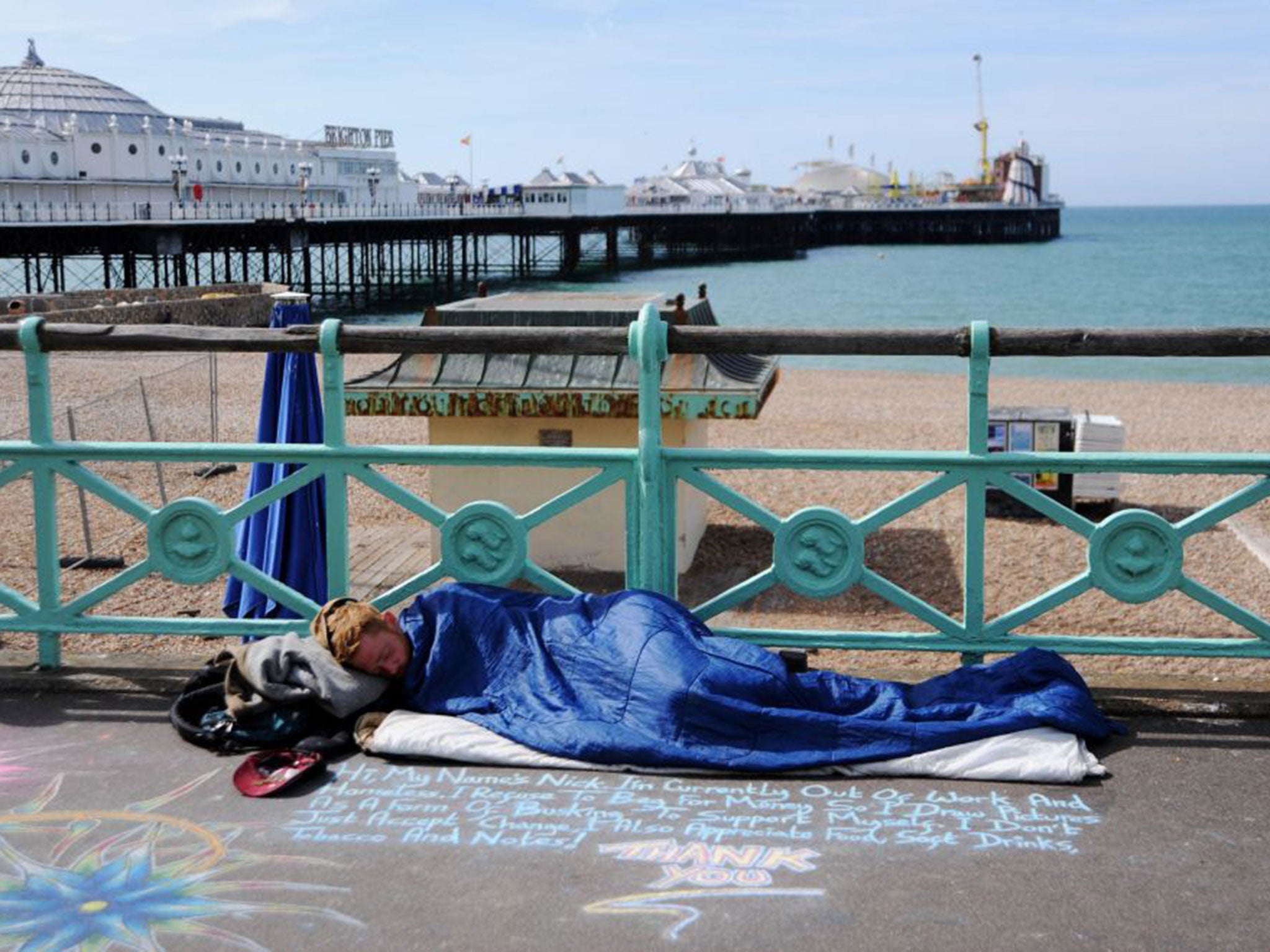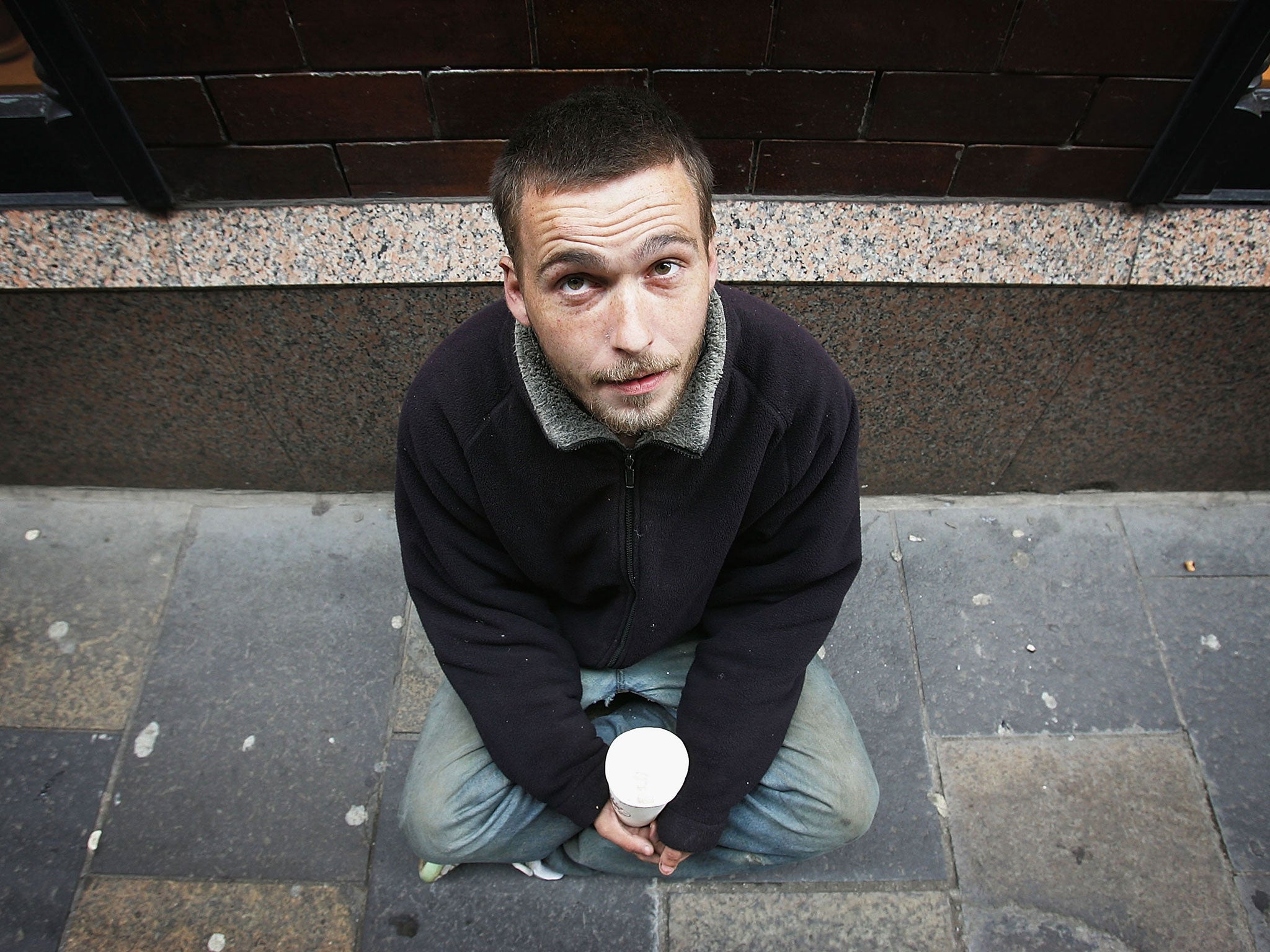Sussex Police 'criminalising rough sleepers by using plain clothes officers to catch people begging'
Critics argue that fines imposed for begging offences simply increase the financial burden on rough sleepers

A police force has been accused of needlessly criminalising rough sleepers by using plain clothes officers to catch people begging on the streets.
Sussex Police last year arrested more than 60 people in Brighton for begging as part of an operation which uses non-uniformed officers to monitor homeless individuals and then move make arrests if they are witnessed asking for money.
The strategy has caused an outcry in the south coast city with critics arguing that fines routinely imposed for begging offences simply increase the financial burden on rough sleepers, many of whom have issues with drug or alcohol abuse.
Demands are also being made for the repeal of the 192-year-old, pre-Victorian law used to arrest beggars, which was introduced tackle “idle and disorderly persons, rogues and vagabonds”.
The row will give rise to fresh debate about how police forces deploy their resources in the wake of 25 per cent budget cuts over four years. A senior police chief said last year that officers may no longer attend some burglaries while it emerged that the Leicestershire force it was not fully investigating attempted break-ins at odd-numbered houses as part of a three-month experiment to save money.
Jason Knight, a Brighton businessman who works with homeless people in the city, said: “People are effectively being victimised for sleeping rough. We have a ridiculous situation where homeless people are being arrested for asking for a few pennies, fined by the courts and then put back out on the street. These are vulnerable individuals who are being criminalised. Surely the police have something else they could be doing with undercover officers than this?”

A defence lawyer who routinely deals with cases involving homeless people and individuals with mental health issues in Brighton said he was dealing with an increasing number of begging cases.
Ray Pape said: “It is difficult to see why it is in the public interest to pursue these cases. I am not talking about aggressive begging or harassment but situations where people have asked for a few pence.
“I currently have two cases where the arrest was made by plain clothes officers. In one case it was two officers who stood in close proximity to the individual hoping that they would be asked for some change.
“Is this a good use of public money? We are talking about the cost of officers’ time to make and process these arrests, the cost of detention and the cost of prosecution.”
Sussex Police said it had arrested 62 people for begging last year as part of a long-running crackdown on the practice. Several other forces have run similar operations, including West Midlands Police which has also used plain clothes officers in Birmingham city centre to deter begging after saying surveys showed it was one of the issues that caused the highest levels of public concern.
The Sussex force acknowledged its use of non-uniformed officers to catch beggars but said it was targeting repeat offenders who had refused assistance and it did not seek to arrest those who were already working with support agencies.
In a statement, the force said: “We use plain clothes officers to gather evidence against people begging as they are not likely to ask a uniformed officer for money.
“If we know someone who has been begging is now engaging with the various programmes and agencies, then we will look for alternative ways to address the anti-social behaviour...It is unlikely that they will be arrested. However, if we see someone begging who has refused help from the agencies, then they can be arrested.”
Campaigners said a significant issue was the arcane legislation being used to arrest and prosecute beggars. The 1824 Vagrancy Act, which outlaws activities such as fraudulent palmistry and unlicensed trading by “petty chapman”, defines begging as a person “placing himself or herself in any public place, street, highway, court, or passage, to beg or gather alms”.
Mr Pape said: “This a massively outdated piece of legislation and it should be replaced. Begging offences should have a requirement to show some form of harassment.”
Charities who work with homeless people said that begging was more closely linked with long-term drug or alcohol addiction problems and many rough sleepers do not beg.
Figures produced by police forces last year showed that only around a fifth of people arrested for begging in 2014 were legally defined as homeless, though others were also likely to be in transitory accommodation such as hostels.
Mike Nicholas, of Thames Reach, one of the largest providers of outreach services in London, said: “We find that the main factor in begging is an addiction to hard drugs such as heroin or crack. Money given to those begging is being spent to satisfy that addiction and ultimately finding its way into the pockets of drug dealers. Homelessness does not necessarily lead to begging but drug addiction does. The way to help these individuals is to help them break the cycle of addiction and get them the care and support they need.”
The 1824 Vagrancy Act
The law being used to clamp down on begging in British cities in the 21st century was introduced nine years after the Battle of Waterloo in part to deal with an increasing problem with jobless soldiers discharged following the Napoleonic Wars.
Such is the vintage of the legislation that its original critics included the anti-slavery campaigner William Wilberforce, who complained it was too sweeping and failed to take into account individual circumstances.
It is a view shared by many of the law’s contemporary detractors, who say its failure to distinguish between aggressive begging or harassment and so-called passive begging, such as simply sitting in the street, makes it an archaic and overly-blunt legal tool.
The legislation, which includes a legal definition of the term “incorrigible rogue”, has been entirely repealed in Scotland and was thought to have become defunct in England.
But a rise in homelessness has seen it return to fashion in law enforcement circles.
Bookmark popover
Removed from bookmarks